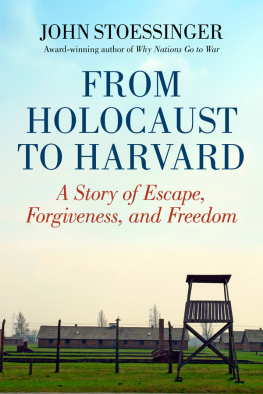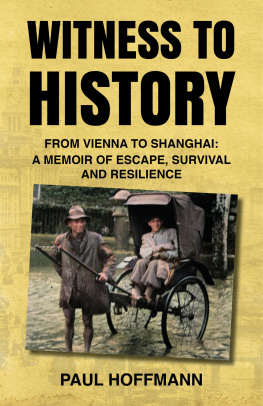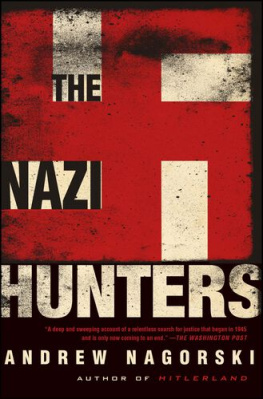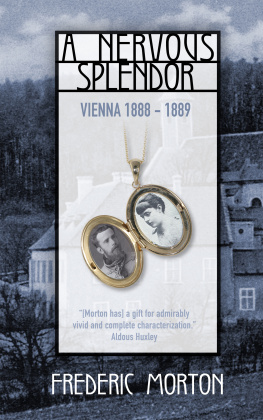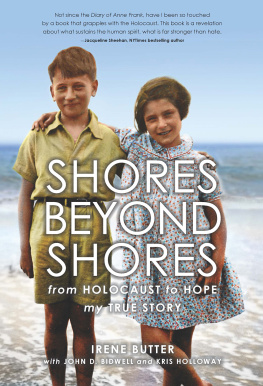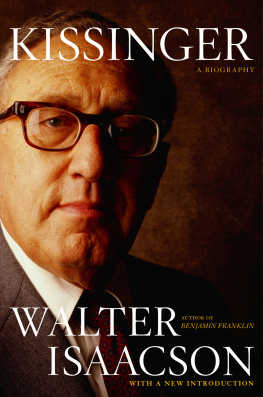
Also by
J OHN G. STOESSINGER
The Refugee and the World Community
The Might of Nations: World Politics in Our Time
Financing the United Nations System
Power and Order
The United Nations and the Superpowers
Nations in Darkness: China, Russia, and America
Why Nations Go to War
Henry Kissinger: The Anguish of Power
Night Journey
Crusaders and Pragmatists: Movers of Modern American Foreign Policy

Memoirs by definition are written depictions of events in peoples lives. They are memories. All the events in this story are as accurate and truthful as possible. Many names and places have been changed to protect the privacy of others. Mistakes, if any, are caused solely by the passage of time.
Copyright 2014 by John G. Stoessinger
Photos provided by the author unless otherwise noted.
All rights reserved. No part of this book may be reproduced in any manner without the express written consent of the publisher, except in the case of brief excerpts in critical reviews or articles. All inquiries should be addressed to Skyhorse Publishing, 307 West 36th Street, 11th Floor, New York, NY 10018.
Skyhorse Publishing books may be purchased in bulk at special discounts for sales promotion, corporate gifts, fund-raising, or educational purposes. Special editions can also be created to specifications. For details, contact the Special Sales Department, Skyhorse Publishing, 307 West 36th Street, 11th Floor, New York, NY 10018 or .
Skyhorse and Skyhorse Publishing are registered trademarks of Skyhorse Publishing, Inc., a Delaware corporation.
Visit our website at www.skyhorsepublishing.com.
10 9 8 7 6 5 4 3 2 1
Library of Congress Cataloging-in-Publication Data is available on file.
Cover design by Richard Rossiter
Cover photo credit ThinkStock
Print ISBN: 978-1-62914-652-2
Ebook ISBN: 978-1-62914-959-2
Printed in the United States of America
CONTENTS
For Janis, with love
C HAPTER 1
Vienna, 1938
A holiday had been declared all over Austria and the schools had been closed. Tens of thousands of Viennese had dressed in their Sunday best, each straining toward the Ringstrasse. The mood in the city was festive, with church bells tolling incessantly and houses everywhere adorned with spring flowers and large swastika flags. The city had turned out en masse to greet its new Fuehrer.
The Ringstrassethe main thoroughfare of Viennawas a great boulevard circling the city. It seemed that all of Vienna was lining the Ring to celebrate Austrias absorption into the Reich; it was the day of the Anschluss, and Adolf Hitler was making his triumphal entry into Vienna in a grand motorcade several miles long. He was to be welcomed by the blaring of trumpets and the thunder of drums from scores of marching bands, accompanied by the marching of the vast goose-stepping armies of the Wehrmacht, the SS, and the SA. The German leader was to ride past the waving throngs of Viennese in an open limousine.
By the time I arrived, the crowd lining the Ringstrasse had already begun to cheer, even before the Fuehrers arrival. Latecomers, hearing the noise and fearful of missing the parade, were all running in the same directionthe young couples, eyes laughing and arms intertwined, easily overtaking the older generations.
Only ten years old and wiry, I ran faster than most. I, too, was eager to get a glimpse of the German Fuehrer who was coming to annex my hometown. Lisl had promised she would wait for me at the Beethoven statue. She was a music student at the Vienna Academy of Art my mother had hired as a part-time governess and piano teacher. Only twenty-three, Catholic, and very beautiful, her eyes were the color of cornflowers and her blond hair reached down almost to her waist. She had told me about Schuberts early death at thirty-one, and together we had made the pilgrimage to Heiligenstadt to pay homage to Beethoven. Her favorite composer was Mozart, however. Once, she had taken me to St. Stephens Cathedral to hear the Great Mass in C Minor.
When the angels are on duty in heaven, Lisl had said, they play Bach; but off duty, they play Mozart.
She had wept afterward when she told me that Mozart was buried in an unknown grave. I had promised her someday I would try to find Mozarts final resting place; I was so in love with Lisl, I would have promised anything to stop her tears.
But on this day, I could not spot her. By now, people were packed ten deep along the Ringstrasse, all eyes riveted on the steel-helmeted storm troopers on motorcycles who formed the vanguard of Hitlers victory procession. Soon, a row of cars appeared and the shouting became louder. I made my way through the crowd as I searched for Lisl.
The Fuehrer will pass here in five minutes, a high-pitched voice exclaimed behind me. Turning, I saw Lisl standing in the front row and happily pushed through the last few feet of the cheering throng, finally reaching for her hand.
Lisl glanced down at me. I had never seen her look so radiant, yet she seemed strangely distant and did not give my hand the reassuring squeeze of recognition I craved. I became uneasy.
We must be silent, she whispered, almost reverently. The Fuehrers car is coming.
I nodded obediently, studying Lisls face. Her eyes seemed to burn with an ardent fire, and her hair was windblown in the March breeze. At that very moment, a great roar went through the crowd. An open Mercedes-Benz automobile had become visible in the distance and was slowly moving toward us. A solitary figure stood within it, his arm outstretched in a stiff salute.
Lisl let go of my hand and reached for the little golden cross she wore between her breasts. This was a gesture she made habitually when reciting the Lords Prayer to me at bedtime. Its a prayer Jews can say, too, she liked to say on those occasions.
Hitlers car was inching closer, and then, for some unknown reason, it came to a complete standstill almost directly in front of us, only a few feet away. The cheering around us had risen to a deafening crescendo: We thank our Fuehrer. We thank our Fuehrer. Again and again the crowd chanted the same refrain. I looked at Lisl, still clutching her cross. Her eyes had become glazed.
Holy Maria, Mother of God, she whispered. He is the new Messiah.
Hitler had dropped his arm for a moment and stood smiling, looking handsome and kind. It seemed to me he was looking directly at Lisl. With a sudden pang of familiarity, I fixed my eyes on his mustache. Just like Papas, I thought.
My beloved father, who had disappeared years ago, used to tickle the soles of my feet with his mustache as he kissed them. I was heartbroken when he vanished and had spent weeks searching for him. Convinced it was my fault he had gone away, I had promised Mama that I would never be bad again.
Please make him come back, Mutti, I pleaded, to which my mother could only cry.
One day, I thought I saw him on the street and ran into an oncoming car. The driver had braked at the last instant; I escaped with only a few bruises.
For a big boy of ten, you shouldnt be so careless, the doctor had warned me.
Nevertheless, I thought I saw Papa everywhere. The pain was like a wild animal raging inside me. Gradually, its grip lessened, but never left entirely. Papas sudden disappearance would remain a mystery throughout my life.
I was awakened from my reverie by Lisls voice, just as Hitlers car lurched forward.
He has the most beautiful eyes, she said. Did you notice?
Next page
